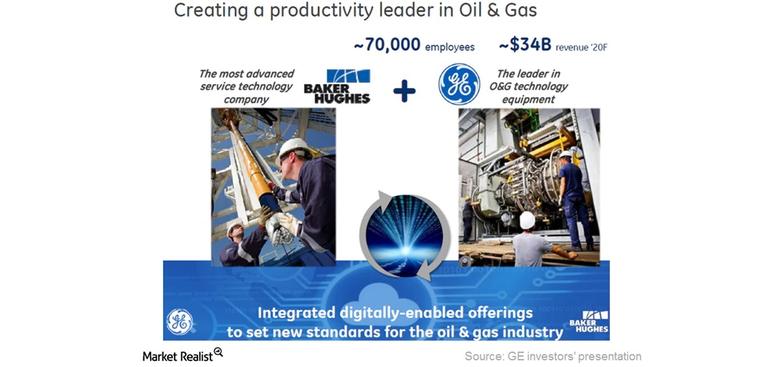
GE & BAKER HUGHES DEAL

WSJ - General Electric Co. closed its deal to combine its long-suffering energy business with Baker Hughes Inc. on Monday, creating one of the largest companies in the oil-field services industry.
The new publicly traded company, which will retain the Baker Hughes name, will pursue further cost cuts as it awaits an elusive recovery in oil prices. Majority-owned by Boston-based GE, it will trade on the New York Stock Exchange under the symbol BHGE, with dual headquarters in Houston and London.
While oil services wasn't a core part of GE's industrials business, the new Baker Hughes could be better equipped to compete with industry leaders Halliburton Co. and Schlumberger Ltd. in providing equipment and services to major oil producers.
"We are really filling one of the gaps that GE oil and gas had with oil-field services," said Lorenzo Simonelli, who is CEO of the new company after having run GE's oil and gas operations. "It evens out the total exposure in the portfolio."
GE has been cutting costs for years but plans to trim another $1.2 billion from the combined company by 2020. It has declined to say how many employees could lose their jobs as a result of the merger.
The deal gives GE a larger footprint in an industry that has been decimated since 2014 as oil prices fell from over $100 a barrel to less than $30. The industry shed more than 160,000 jobs over the last three years and was forced to accept pricing cuts—sometimes more than 50%—from its customers. More than 200 oil-field-service companies went bankrupt.
The industry's outlook rebounded earlier this year as oil prices stabilized around $50 per barrel, but optimism has fizzled with another drop in prices in June. Barclays predicts the U.S. rig count, a widely used measure for drilling activity, to decline by the end of the year, after adding 270 rigs earlier this year.
Reduced drilling could make one of Baker Hughes's key businesses even more lucrative: artificial lift, a technology used to force oil out of older wells as they run dry. Baker Hughes owns about 18% of the global market for artificial lift, second only to Schlumberger, while GE controls about 11%, according to 2016 data from Spears & Associates.
GE's core business is making jet engines, turbines, MRI machines and other heavy-duty industrial equipment, and its oil and gas operations have long weighed on financial results. Baker Hughes is focused on oil-field services, helping producers drill and frack their wells. The deal will double GE's exposure to the exploration-and-production side of the industry.
Baker Hughes, formed in a 1987 merger of Baker International and Hughes Tool, dates back to Howard Hughes Sr.'s revolutionary drillbit invention in the early 20th century.
Halliburton attempted to buy the company in 2014 in a $28 billion deal that was ultimately scuttled in early 2016 amid regulatory objections. During those negotiations, the companies held talks with GE to sell off more than $7 billion in assets to help win federal approval.
Today, oil and gas extraction are increasingly technically sophisticated, and GE plans to make a push into sensors and data that can boost oil-field profitability. Some analysts believe the shifts in the industry have created openings for leaner, more efficient and digitally minded service providers to gain market share.
"We continue to view [the merger] as one of the most transformative deals to take place in the oil-service space in decades," Evercore ISI analyst James West wrote in a note to investors. "The new entity should be considered an industry powerhouse with a full cycle portfolio of products and services...and a leading position at the forefront of the digital revolution."
The new structure could also allow GE to exit the sector entirely, analysts have noted. When GE's new chief executive, John Flannery, takes the helm in August, he is expected to review the conglomerate's entire portfolio.
"It remains to be seen if oil and gas is a keeper," said Deane Dray, an analyst at RBC Capital Markets, adding, "If GE hadn't done this deal, they would be in a worse situation."
-----
Earlier:
BAKER HUGHES NET LOSS $129 MLN
BAKER HUGHES NET LOSS $2.7 BLN
HALLIBURTON VS U.S.: SENSELESSLY
HALLIBURTON & BAKER HUGHES TERMINATION
HALLIBURTON & BAKER HUGHES CONTEST
HALLIBURTON & BAKER HUGHES PROBLEMS: $35 BLN





